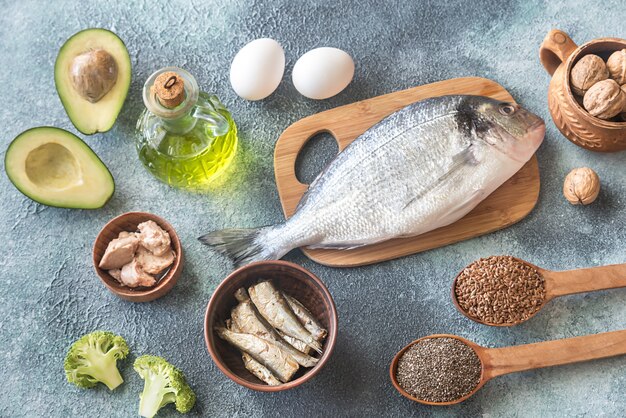There’s a lot of research on diet and mental well-being now, and more and more, it becomes apparent that food and mood are connected. You can indeed “eat for happiness” through the impact of nutrients on your mood. Foods like omega-3s, probiotics, and so on all play important roles in promoting mental wellness. Armed with this knowledge, we can make the right decisions that lift our spirits and increase our resilience. So let’s dig into these mood-boosting foods and how you can bring them into your life.
Important Mood-Boosting Nutrients
Many nutrients have proved to be essential in serving and supporting neurotransmitters. Those nutrients reduce the impact that stressful situations have on lives; therefore, they strengthen and improve moods. Essential players include:
Omega-3 Fatty Acids
Omega-3 is of great importance regarding healthy brain function due to the anti-inflammatory effects through an increase in cell membrane fluidity and, as an offshoot, enhanced cell communications. Many studies actually demonstrate that high intake in cases of omega-3 leads to lower levels of both depression and anxiety symptoms.
Sources: Fatty fish such as salmon, mackerel, and sardines, and chia seeds, walnuts, and flaxseeds.
How to include in your diet: You should eat at least two portions of fatty fish a week or add chia and flax seeds to your smoothies, oatmeal, or salads.
Magnesium
Often known as the “relaxation mineral,” magnesium helps in maintaining neurotransmitters, which regulate moods. The reduction in cortisol due to magnesium has been correlated with lessened anxiety and mental clarity.
Sources: Leafy greens such as spinach, kale; almonds, cashews; whole grains; and avocados
How to Add It: Have a smoothie at the start of the day, made of spinach, or spread some nuts on your snack time for adding magnesium into your diet.
B Vitamins
B Vitamins especially B6, B9 (folate), and B12, can synthesize serotonin and dopamine. Both are often labeled “hormones” for happiness and are important in the function of the brain to give us energy and thereby maintain the mood. Found in eggs, lean meat, beans, and other whole grains.
How To Use In Your Diet
Eggs and lean meat can readily provide B vitamins. As for plants, include lentils or beans on soups and stews.
The Gut-Brain Connection: Foods for a Healthier Gut and Mind
Since 90% of the neurotransmitter serotonin, in charge of regulating mood is produced in the gut digestive health has a direct role in mental states. Health balance in the gut microbiome favors serotonin production while an inflammatory gut does not
Probiotics and Fermented Foods
Dietary sources rich in probiotics improve gut health since they increase good bacteria, hence positively impacting mental well-being. A balanced gut microbiome promotes serotonin synthesis and hence mental stability.
Sources: Yogurt, kefir, sauerkraut, kimchi, and kombucha.
How to Incorporate Them in Your Diet: Top yogurt or kefir over a bowl of oatmeal and start using sauerkraut on sandwiches for a super easy probiotic bump.
High Fiber Foods
These high-fiber foods fuel the beneficial gut bacteria responsible for producing short-chain fatty acids. Short-chain fatty acids help dampen inflammation while promoting a healthy gut lining and stabilizing mood and energy.
Sources: Fruits (apples, berries), vegetables (especially leafy greens), and whole grains.
How to Eat It: Start with a salad, and add more vegetable and fruit portions for each meal.
Blood Sugar Balance and Its Part in Mood Stability
Ragging blood sugar makes your emotions unstable. High glycemic foods trigger the elevation, then a drop of sugar content; low glycemic food intake steadies your energy while achieving a balance in moods.
Whole Grains
Whole grains are rich in fiber, slow down digestion, and release energy for a longer period of time. This way, they keep the mood stable. Quinoa, oats, and brown rice are some examples of it.
Lean Proteins
Chicken, fish, and legumes take longer time to digest carbohydrates and thereby avoid the blood sugar spike and thus, prevent mood swings.
How to Assemble Balanced Meals
Consume meals containing complex carbohydrates, protein, and healthy fats and keep energetic all day long. For instance, have a dinner of grilled chicken with mixed leafy greens, walnuts, and quinoa for the lean proteins, the right carbs, and the fats for your body and your brain.
Stress and Anxiety Reducers
Some foods are known to specifically calm down stress and even induce serenity.
Dark Chocolate
Dark chocolate contains antioxidants and compounds that can stimulate the production of endorphin-releasing agents. However, do not forget about calorie count.
How to Use: A small amount of about 1 oz of high-quality dark chocolate can perk up your mood without overindulging.
Chamomile Tea
Chamomile tea is widely used for its soothing properties that can reduce stress and therefore help in sleep, calm the mind, and lead to mental relaxation.
How to Use: Warm chamomile tea should be taken at night or at a time when you are very stressed.
Turmeric
Turmeric, rich in curcumin, is a strong anti-inflammatory and has been shown to positively influence mood and reduce symptoms of anxiety. It also promotes the protein brain-derived neurotrophic factor, which has been linked to mental health.
How to Include in Your Diet: Add a pinch of turmeric to smoothies, soups, or warm milk for an antioxidant boost.
Conclusion
The strategy of “eating for happiness” is a remarkable and enjoyable approach to mental wellness. By focusing on nutrient-dense foods and proper supplementation, you can build a foundation for mood and mental health. Including probiotics, managing blood sugar with balanced meals, and adding anti-anxiety foods like dark chocolate, chamomile, and turmeric can stabilize mood and reduce stress. For those looking to go further, Doctors Best Wellness offers targeted supplements to support mental wellness, providing an additional resource in your journey toward better health and happiness.



Follow us